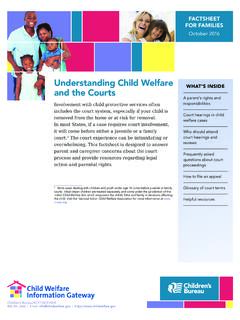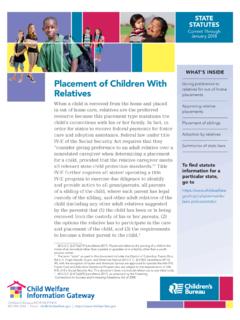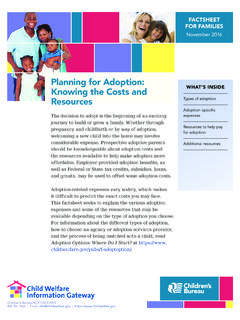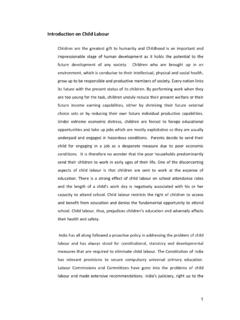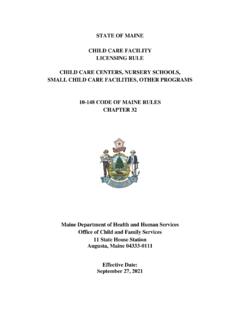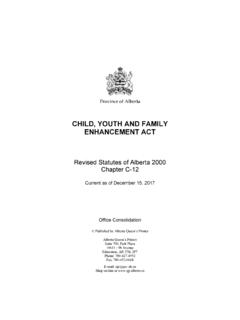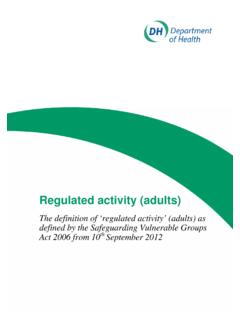Transcription of The Rights of Presumed (Putative) Fathers ... - Child Welfare
1 STATE STATUTES The Rights of Presumed (Putative) Fathers : Summary of State Laws The number of nonmarital births in recent decades has led to an increased focus on the Fathers of these children. Many of these alleged (or reputed or putative) Fathers of nonmarital children seek recognition of their legal Rights and expanded roles in the upbringing of their children. Constitutional Rights Historically, putative Fathers have had fewer Rights with regard to their children than either unwed mothers or married parents. Over the past several decades, putative Fathers have used the Fourteenth Amendment to challenge the termination of their Current Through October 2007 Electronic copies of this publication may be downloaded at laws_policies/ To find statute information for a particular State, go to laws_policies/ To find information on all the States and territories, order a copy of the full-length PDF by calling or , or download it at laws_policies/ Child Welfare Information Gateway Children s Bureau/ACYF 1250 Maryland Avenue, SW Eighth Floor Department of Health and Human Services Administration for Children and Families Washington, DC 20024 Administration on Children, Youth and Families or Email: Children s Bureau The Rights of Presumed (Putative) Fathers : Summary of State Laws State Defi nitions of Father parental Rights when the birth mothers relinquish their children for adoption.
2 Nevertheless, States have almost complete discretion to determine the Rights of a putative father at termination of parental Rights or adoption proceedings. The Supreme Court has affirmed the constitutional protection of a putative father s parental Rights when he has established a substantial relationship with his Child . The Court defined a substantial relationship as the existence of a biological link between the Child and putative father, and it defi ned the father s commitment to the responsibilities of parenthood as participating in the Child s There is no standard definition for father in statutes across the States. Approximately five States, the District of Columbia, American Samoa, and the Virgin Islands provide no definition for the Putative father is defined in statute in 11 Although there is some variation in language, putative father generally means a man who is alleged to be or claims to be the biological father of a Child who is born to a woman to whom he is not married at the time of the Child s birth.
3 In approximately 21 States and the Northern Mariana Islands, a man may be Presumed to be the father of a Child in any of the following circumstances:4 He and the Child s mother are or have been married to each other, and the Child is born during the marriage or within 300 days after the marriage has ended. Before the birth of the Child , he and the Child s mother attempted to marry, and the marriage is or could be declared invalid, and the Child is born during the marriage or within 300 days after the marriage is terminated. 1 Stanley v. Illinois, 405 645 (1972); Quilloin v. Walcott, 434 246 (1978); Caban v. Mohammed, 441 380 (1979); Lehr v. Robertson, 463 248 (1983). 2 The word approximately is used to stress the fact that States frequently amend their laws. This information is current through October 2007. Arizona, Nebraska, New York, North Carolina, and Virginia currently do not defi ne father in statute.
4 3 Arkansas, Florida, Indiana, Iowa, Maine, Montana, Nevada, Oklahoma, South Dakota, West Virginia, and Wyoming. 4 Alabama, California, Colorado, Delaware, Hawaii, Illinois, Kansas, Massachusetts, Minnesota, Missouri, Montana, Nevada, New Jersey, New Mexico, North Dakota, Ohio, Rhode Island, South Carolina, Tennessee, Texas, and Washington. This material may be freely reproduced and distributed. However, when doing so, please credit Child Welfare Information Gateway. Available online at 2 The Rights of Presumed (Putative) Fathers : Summary of State Laws Putative Father Registries Alternate Means to Establish Paternity With his consent, he is listed as the father on the Child s birth certifi cate. He has acknowledged his paternity in writing. He is obligated to support the Child , either by voluntary agreement or court order. While the Child is a minor, he has resided with the Child and openly claimed the Child as his biological Child .
5 Many States have provisions for a father to voluntarily acknowledge paternity. Approximately 23 States have established putative father registries for this In 12 States, the District of Columbia, and the Virgin Islands, there are provisions for voluntary acknowledgment of paternity through forms that are filed with social services departments, registrars of vital statistics, or other similar Acknowledgment of paternity provides the father with the right to receive notice of court proceedings regarding the Child , including petitions for adoption or actions to terminate parental Rights . In 10 States with putative father registries, filing with the registry is the sole means for establishing this right of An acknowledged father may also seek visitation with the Child and usually will be required to provide financial support to the Child . In 21 States and the Northern Mariana Islands, a person may claim paternity to a Child by filing an acknowledgment or affidavit of paternity with a Paternity of a nonmarital Child may also be established by court order.
6 5 Alabama, Arizona, Arkansas, Delaware, Florida, Georgia, Illinois, Indiana, Iowa, Louisiana, Minnesota, Missouri, Montana, Nebraska, New Hampshire, New Mexico, New York, Ohio, Oklahoma, Tennessee, Texas, Virginia, and Wyoming. 6 Alaska, California, Hawaii, Idaho, Kansas, Kentucky, Mississippi, Nevada, Pennsylvania, South Dakota, Utah, and Wisconsin. 7 Alabama (for births occurring after 1/1/1997), Delaware, Florida, Georgia, Illinois, Indiana, Montana, New Hampshire, Tennessee, and Virginia. 8 Alabama, Arizona, Arkansas, Florida, Idaho, Indiana, Kansas, Kentucky, Louisiana, Maryland, Massachusetts, Michigan, Mississippi, New Hampshire, New Mexico, North Dakota, Oregon, Rhode Island, Texas, Virginia, and Washington. This material may be freely reproduced and distributed. However, when doing so, please credit Child Welfare Information Gateway. Available online at 3 The Rights of Presumed (Putative) Fathers : Summary of State Laws Required Information Revocation of Claim States differ in the information they require for registration or acknowledgment of paternity, although the required information may include.
7 Name, address, Social Security number, and date of birth of putative father and birth mother Name and address of any person adjudicated by a court to be the father The Child s name and date of birth or expected month and year of the Child s birth Registration date Other information deemed necessary Approximately 42 States, the District of Columbia, and the Virgin Islands make provisions in their statutes that allow putative Fathers to revoke or rescind a notice of intent to claim Of these States, approximately 14 allow revocation at any Revocation is effective only after the Child s birth in Arkansas and Iowa, and Florida allows revocation of a registration prior to the Child s birth only. Approximately 27 States, the District of Columbia, and the Virgin Islands limit the right of rescission to 60 days after the paternity claim is submitted or prior to a court proceeding to establish paternity, whichever occurs fi In 19 States and the Virgin Islands, a claim of paternity may not be revoked after the 60-day period 9 Alabama, Alaska, Arkansas, California, Colorado, Connecticut, Delaware, Florida, Georgia, Hawaii, Idaho, Illinois, Indiana, Iowa, Kansas, Louisiana, Maine, Maryland, Massachusetts, Michigan, Missouri, Montana, Nebraska, Nevada, New Hampshire, New Jersey, New Mexico, New York, North Dakota, Ohio, Oklahoma, Oregon, Pennsylvania, Rhode Island, South Dakota, Tennessee, Texas, Utah, Virginia, Washington, Wisconsin, and Wyoming.
8 10 Alabama, Delaware, Indiana (of the registration), Missouri, Montana (of the registration), Nebraska, New Mexico, New York, Oklahoma, Oregon, Tennessee, Texas (of the registration), Wisconsin, and Wyoming. 11 Alaska, California, Colorado, Connecticut, Florida (of an acknowledgment of paternity), Georgia, Hawaii, Idaho, Illinois, Indiana (of an acknowledgment), Louisiana, Maine, Maryland, Massachusetts, Mississippi, Montana (of an acknowledgment), Nevada, New Hampshire, New Jersey, North Dakota, Ohio, Oregon, Pennsylvania, Texas (of an acknowledgment), Utah, Virginia, and Washington. This material may be freely reproduced and distributed. However, when doing so, please credit Child Welfare Information Gateway. Available online at 4 The Rights of Presumed (Putative) Fathers : Summary of State Laws Access to Information except by court action on the basis of fraud, duress, or material mistake of Most States will accept a written, notarized statement for rescission.
9 Seven States, however, require a court proceeding for revocation of a Access to information maintained in registries also varies from State to State. Many jurisdictions permit certain persons access to registry records. In general, these are people with a direct interest in a case. Typically, persons entitled to access include birth mothers, courts, attorneys, licensed adoption agencies, prospective adoptive parents, State departments of social services, State offices of Child support enforcement, registries of States, or any other person upon a court order for good cause. This publication is a product of the State Statutes Series prepared by Child Welfare Information Gateway. While every attempt has been made to be as complete as possible, additional information on these topics may be in other sections of a State s code as well as agency regulations, case law, and informal practices and procedures. 12 Connecticut, Florida, Georgia, Hawaii, Idaho, Louisiana, Maine, Maryland, Massachusetts, Mississippi, Nevada, New Hampshire, New Jersey, North Dakota, Ohio, Oregon, Pennsylvania, Utah, and Virginia.
10 13 Colorado, Kansas, Michigan, Rhode Island, South Dakota, Texas, and Washington. This material may be freely reproduced and distributed. However, when doing so, please credit Child Welfare Information Gateway. Available online at 5 The Rights of Presumed (Putative) Fathers : Summary of State Laws Alabama Legal Defi nition of Father Ala. Code 26-17-5 A man is Presumed to be the natural father of a Child if any of the following apply: He and the Child s natural mother are or have been married to each other and the Child is born during the marriage or within 300 days after the marriage is terminated by death, annulment, declaration of invalidity, or divorce, or after a decree of separation is entered by a court. Before the Child s birth he and the Child s natural mother have attempted to marry each other by a marriage solemnized in apparent compliance with law, although the attempted marriage is or could be declared invalid, and: If the attempted marriage may be declared invalid only by a court, the Child is born during the attempted marriage or within 300 days after the termination of the attempted marriage.



